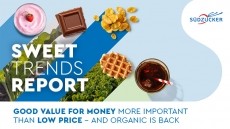EC bids to offset sugar supply shortfall in EU next year

Yesterday saw new proposals from the EU’s Sugar Management Committee that could allow for the possibility of the release up to 400 000 t of out-of-quota sugar onto the internal market against the payment of a levy of €85 € per tonne as opposed to the usual tariff of €500/t.
The Committee also suggested the opening of a tender for fixing a minimal duty for exceptional sugar imports into the EU.
A spokesman for the Commission said: "As our primary aim is to ensure that the EU market is well supplied, these proposals are designed as the most efficient measures to secure additional quantities for the domestic market - by both facilitating imports and taking advatange of the abundance of the out-of-quota harvest within the EU."
And in a bid to improve price transparency, the EU sugar managers also backed further regulation that would allow information from the price monitoring system to be made available the following month, three months earlier than under the current rules.
Food and drink industry reaction
Muriel Korter, general secretary, the Committee of European Sugar Users (CIUS), in reaction to the proposals, told FoodNavigator.com the reclassification of 400,000 tonnes of out-of-quota sugar "is good news but not enough. The total bumper crop is as high as 4.9m tonnes."
The trade group noted in September that EU sugar supplies were at their most critical levels since the 2005 sugar reform and were causing ‘extreme volatility, instability and disruption’ to the European food and drink industry.
The trade body’s food and beverage members – the likes of Cadbury, Coca-Cola, Unilever and Ferrero – buy almost 70% of EU sugar consumed annually.
And the industry representatives claim that it was “poor market intelligence on actual sugar volume availability in the EU” that led to inadequate planning and slow adoption of corrective measure by the EC and its Sugar Management Committee.
Severe EU supply shortages throughout 2010/11 were due to lower EU beet production and insufficient cane sugar imports from African, Caribbean and Pacific nations and other nations to meet EU demands.
Korter claims that the move to increase out-of-quota exports by 700,000t, in addition to the 650,000t already foreseen, up to the WTO limit of 1.35m tonnes, with new licences available from 1 December is "too early."
"The decision should have been made only end of February when certainty in the final crop would have been secured. We are questioning if [there] will be enough sugar left as buffer stock after these exports. Therefore, a suspension of these exports until February [should have been] envisaged," she added.
The CIUS spokesperson said that opening tenders only to full refiners in December but to all from January seems to be a balanced and fair approach to both processors of sugar beet and refiners. "However, we believe that in general, imports with low or no duties should apply systematically when there is a shortage on the market," said Korter.
How the system works
The EU has a fixed quota for sugar and iso-glucose production (13.753m tonnes).
As farmers have no idea about weather conditions at the time the sugar beet is sown, there is always some margin in their cropping plans to be assured of at least producing the quota sugar. If weather conditions are good there is a larger quantity of sugar and all sugar above the quota is called out-of quota sugar, but this cannot be used on the EU internal food market.
The consumption of sugar in the EU food market is rather stable at around 16.5 million tonnes. As this is more than the production of 13.735 million tonnes, it is necessary to import sugar to meet the demand.
In a situation of high world market prices - as seen last year - the required quantities under the existing import provisions may not be sufficient to match consumption requirements. And the Commission reckons this is also likely to be the case in 2011/2012.
It looks to remedy the shortfall in two ways - either through additional imports or the release of so called out-of-quota sugar on the internal market.
Sugar quota elimination
Dacian Cioloş, Commissioner for Agriculture and Rural Development, speaking after the sugar vote, said: "The sugar market situation observed in the EU today again shows the limits of the quota mechanism and its structural shortcomings. This is why I have proposed to end the sugar quota regime within our proposals for reform the CAP after 2013.”
He added that quotas are preventing producers from fully benefiting, thanks to their efforts, from the competitivity achieved in recent years both on the EU market and on world markets.
“This does not mean that we will end all forms of market management. In parallel to the end of the quota regime, I have proposed a framework of modernised market management instruments with true safety nets, a clearer, strengthened role for producer organisations and obligatory contracts, before sowing, between growers and processors,” he added.


























